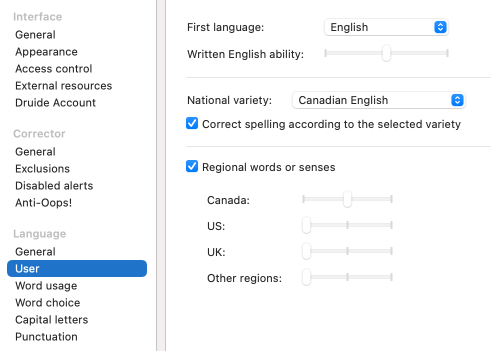User Panel of the Language Settings

First language
Antidote needs to know your first language so it can fine-tune its correction to meet your specific needs. For example, if your first language is French, Antidote will look for certain constructions that a French speaker is more likely to produce (e.g. *I have 34 years for I’m 34 years old, *I suggest you to read it for I suggest you read it, etc.).
- When Antidote is first launched, a dialogue window asks you what your first language is, and this setting is configured according to your response.
Written English ability
Knowledge of the rules of English grammar varies from one person to another. Depending on the level indicated by this setting, Antidote will generate more or fewer detections and will attempt (or not attempt) to recognize certain error-prone constructions.
Choose from three writing skill levels:
- Minimum (written skills are fairly weak): The corrector flags the standard set of errors, but also includes certain additional errors that are commonly made by those learning English.
- Intermediate (written skills are fairly good): The corrector flags the standard set of errors.
- Maximum (written skills are very good): The corrector flags the standard set of errors, but does not flag certain errors that an advanced speaker of English is unlikely to make.
- When Antidote is first launched, you are asked to estimate your written English skills, and this setting is configured according to your response.
National variety
The English spoken around the world varies from one region to another, as do English writing conventions. In British English, for example, verbs like realise and organise are not spelled the same way as in American English, which favours the –ize ending. This setting tells Antidote which variety to use in its dictionaries and for its corrections. You can choose from several national varieties of English.
- When Antidote is first launched, you are asked to indicate your preferred national variety, and this setting is configured according to your response.
Correct spelling according to the selected variety
When this box is checked, Antidote will correct words whose spellings vary by country, in accordance with the National variety setting.
Regional words or senses
All speakers of English employ words and expressions whose use may sometimes be restricted to their particular region or country, even if they are not always aware of it. To reduce the risk of misunderstanding between English speakers from different regions, Antidote can flag a large number of such words.
Choose from three levels of detection sensitivity:
- Minimum: The corrector flags no regionalisms.
- Intermediate: The corrector flags words that are restricted to certain regions in all their senses (e.g. cashpoint in the sense of an ATM is always a Britishism); the corrector does nothing if only one sense is restricted to the given region (e.g. fries is used in Canada and the United States to designate what other English-speaking countries call chips, but fries can also mean “young fish”).
- Maximum: The corrector flags all potential regionalisms.
- When Antidote is first launched, you are asked to indicate your national language variety, and the slider corresponding to that variety is set to intermediate. For example, if you live in the United States, detection sensitivity for Regional words or senses is set to intermediate for regionalisms common to the US and to minimum for regionalisms from other areas of the world. To disable all alerts related to regionalisms without having to configure the setting for each variety individually, uncheck the box in the top left corner of this panel section.
- The regionalisms flagged in the Style (Vocabulary) view depend on these settings.